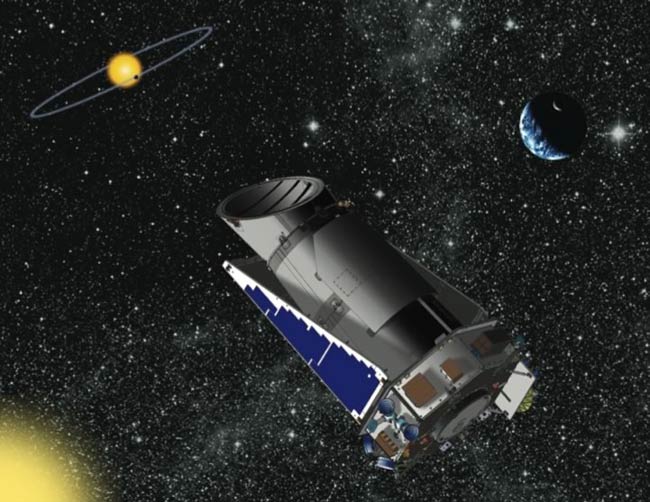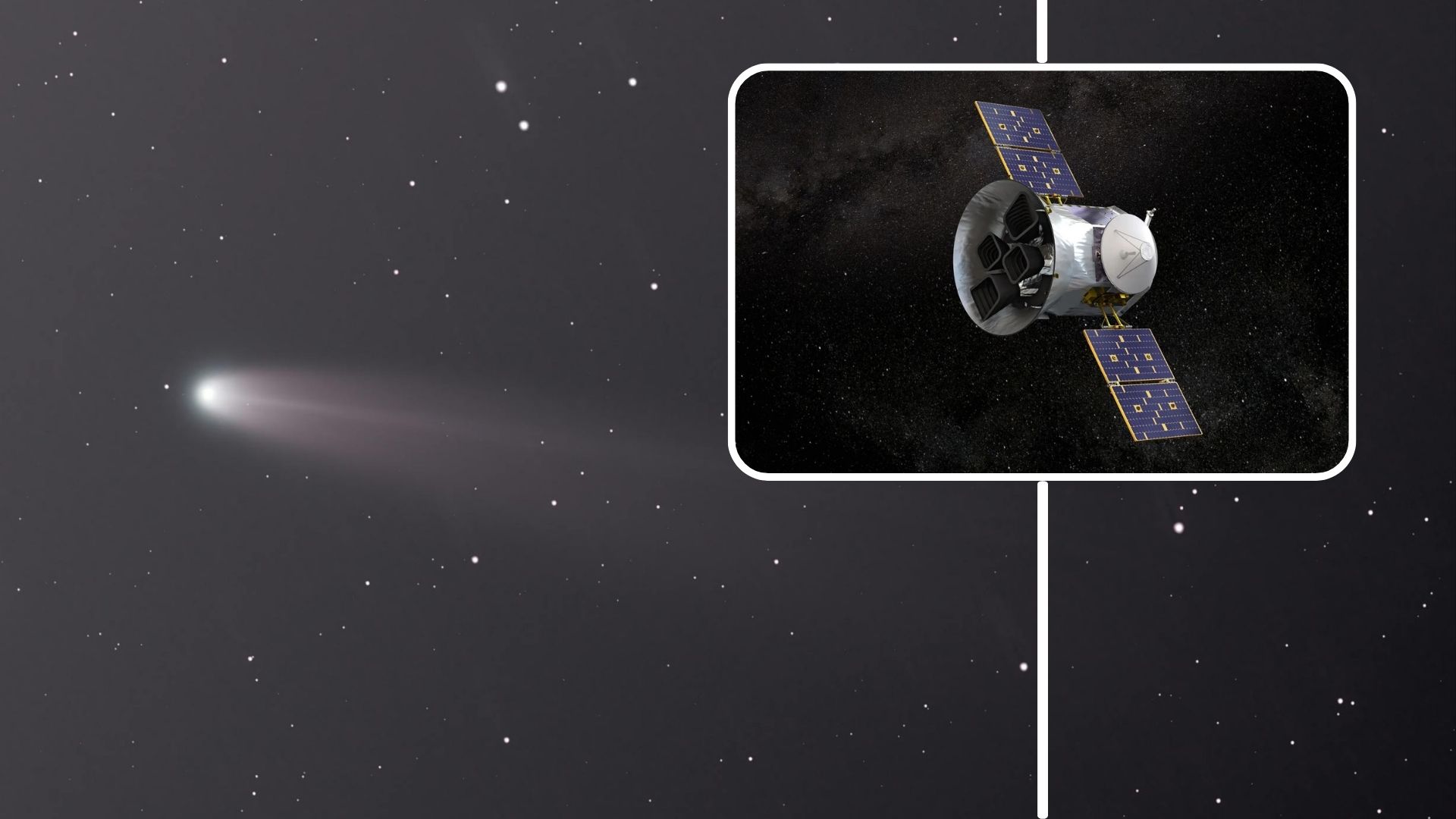Kepler Team Cuts Costs, Avoids Cancellation

Threatened withcancellation, the team building NASA's Kepler planet-hunting telescope found away get the spacecraft to the launch pad by early 2009 without a new infusionof cash.
Kepler consists of asingle instrument, a 0.95-meter Schmidt telescope optimized for scanning afield of stars for signs of potentially habitable Earth-sizeplanets. Integration of the spacecraft gets under way this summer, with thetelescope due to be installed a year from now. A Delta 2 rocket is slated tolaunch Kepler into an Earth-trailing orbit.
The price tag for theDiscovery-class mission has risen several times since its 2001 selection due toa combination of factors, including management problems, technical challengesand budget fluctuations beyond the project's control. In mid-2006, believingKepler's problems were largely in the past, NASA accepted a 21-percent costincrease for construction of the telescope, pushing the total cost of themission above $550 million. The launch date also slipped another five monthspast its original 2006 target to November 2008.
This spring, the Keplerteam ? which consists of Ball Aerospace& Technology, Ames Research Center and the Jet Propulsion Laboratory (JPL)? told NASA science chief Alan Stern it needed an additional $42 million and anextra four months to finish the spacecraft.
"My response was'no, [the Science Mission Directorate] no longer manages by open checkbook. Youneed to find a way to get it back in the box because I don't have $42 millionin the astrophysics program anyway,'" Stern recalled in a July 9interview.
Stern told the team tocome back in June with a plan for getting the job done within the revisedbudget NASA approved for Kepler last year.
"On June 1, theycame with a request for $54 million instead of $42 million, at which point Isaid: 'Kepler project, apparently you don't think I'm serious ... If you don'tthink I'm serious just come back to me with numbers like these again and thatwill be the end of the project.'"
Breaking space news, the latest updates on rocket launches, skywatching events and more!
When he testified beforeCongress in May, Stern made clear that the program was all but canceled at thatpoint ? and that was before the Kepler team responded to his call to cut costsby asking for even more money.
After rejecting theirJune 1 request for another $54 million, Stern gave the Kepler team a month totake another crack at putting their program "back in the box."
On July 6, the Keplerteam returned to NASA headquarters here to present their plan.
"They took us veryseriously," Stern said. "They came back with no cost increase."
The Kepler team,according to Stern, proposed staying within the budget NASA approved in 2006,by cutting six months off the end of the four-year mission, scaling back somespacecraft testing, reducing schedule reserve and making some managementchanges.
In addition, BallAerospace & Technologies, the Boulder, Colo.-based firm building thespacecraft and instrument, gave up "millions and millions of dollars oftheir earned fee," Stern said.
The plan passed musterwith Stern and the other NASA officials who examined it ? including Stern'sscience advisor John Mather, his deputy for programs Todd May and arepresentative from NASA's Office of the Chief Engineer ? as a clear and viablepath to the launch pad.
Ball spokeswoman RozBrown declined to say how much fee the company agreed to forfeit or whether theproject would still prove profitable.
"I can't be specificon the financial stuff," Brown said July 10. "Profit is just onetool. We were determined that we were going to get the program back on trackand we are getting the program back on track. We heard NASA loud andclear."
Kepler will still missits November 2008 launch target by two or three months, but Stern said he couldlive with that.
"The only thing moreimportant than keeping Kepler marching towards launch is to have responsiblemanagement in the Science Mission Directorate," he said. "I won'twrite checks any more. There's a new team in town and we don't work thatway."
While reducing testingand cutting schedule reserves might sound like a recipe for failure, Stern saidneither action would put the success of the mission at risk.
"They found someplaces where they could responsibly de-scope ? where testing was icing on thecake," he said. "They [also] had very lavish schedule reserves bynormal industry standards. They elected to cut themselves back to JPLstandards."
The new plan also ironsout Kepler's convoluted management structure, long since acknowledged by NASAas a contributor to Kepler's woes.
When NASA selected Keplerin 2001 for funding under its Discovery program of scientist-led, cost-cappedmissions, the agency required Ames Research Center ? the San Francisco-areaNASA field center that the proposed Kepler ? to pick either JPL or GoddardSpace Flight Center, Greenbelt, Md., to help run the project.
With JPL added to themix, Kepler essentially had, as Stern put it, "three bosses": the JPLproject manager, the Ames project manager, and Kepler's rookie principalinvestigator (PI), Ames scientist Bill Borucki.
To simplify matters, NASAis putting the entire Kepler team under the direction of Kepler's JPL projectmanager Leslie Livesay, a seasoned engineer who worked on Mars Pathfinder, wasthe flight system manager for Deep Space 1, and ran Starlight before thatambitious three-telescope project was reduced to a ground-based technologydemonstration.
Borucki's role on Kepler,meanwhile, has been reduced from mission principal investigator ? essentiallythe top boss ? to science principal investigator.
"They had to makesome tough choices and it takes a professional program manager and not a rookiePI to do this," Stern said. "But he remains the science PI and willbe in charge of the entire science investigation and lead it to victory."
Brian Berger is the Editor-in-Chief of SpaceNews, a bi-weekly space industry news magazine, and SpaceNews.com. He joined SpaceNews covering NASA in 1998 and was named Senior Staff Writer in 2004 before becoming Deputy Editor in 2008. Brian's reporting on NASA's 2003 Columbia space shuttle accident and received the Communications Award from the National Space Club Huntsville Chapter in 2019. Brian received a bachelor's degree in magazine production and editing from Ohio University's E.W. Scripps School of Journalism.
